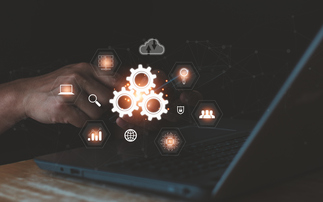Redundancy fears and return-to-work stress creating unmanageable demand, experts warn
Today brought news that social gatherings above six are to be banned in England from Monday.
The announcement comes as a result of a spike in Covid-19 infections, at a time when many people in the UK are returning to the workplace.
Despite the new restrictions, the government is continuing to encourage employees back to work, where social distancing measures are mandatory, while the Confederation of British Industry (CBI) has advised that companies should put in place a ‘hybrid' approach which does not force people to return.
As a country, we just don't have the resources to face the coming crisis in occupational health
In May, a poll from IPSOS Mori revealed that many Brits felt "uncomfortable" about going back to their normal lives and it would be fair to assume that, in light of today's situation, many people will still be reluctant to travel on public transport and gather in office spaces.
With responsibility for managing staff health issues firmly on the shoulders of employers, occupational health experts are warning that they are likely to face unmanageable demand in the UK.
"As a country, we just don't have the resources to face the coming crisis in occupational health" says Dr. Amun Kalia MRCGP MbChB BSc. (Hons) ECPC DOccMed, an occupational health specialist practising in London.
"There are more occupational health jobs than trained doctors or nurses available to fill them and demand for the specialism is rocketing, which means employers will start to face delays accessing services" he said.
Magnus Kauders, managing director of Occupational Health Assessment, an occupational health provider based in the South East, has seen huge increases in the numbers of enquiries in recent weeks. "We usually have predictable seasonal peaks, yet we've seen a 100% increase in demand in the last two weeks alone" he said.
Employer groups share these concerns. The Chartered Institute for Personnel and Development said: "Employee health, safety and well-being is paramount. Employers need to be proactive in protecting their people and minimising the risk to staff."
Meanwhile, the Society of Occupational Medicine has also called for swift action to provide universal access to occupational health across the UK, stressing that only half of the UK's population have access to workplace health support.
Kauders added that employers often find they have a health issue to consider when they embark on a redundancy programme. "The numbers taking those steps now are pushing a wave of problems straight into occupational health to sort out," he said. "It's really difficult for everyone involved."
What are the health and wellbeing implications of lockdown?
Meanwhile, lockdown has put immense strain on the mental health of many employees and this is also increasing the need for additional support. Geoff Heyes, head of health policy and influencing at the mental health charity Mind, has called for proactive detection of problems among Covid-19 survivors, but is concerned NHS mental health services may be already too overstretched.
"Going into this pandemic, only one in three people who needed help for their mental health were actually getting any. Coming out we are going to see even higher demand."
Group protection
According to Group Risk Development (GRiD), the vocational rehabilitation available through group income protection policies (GIP) can "really take the pressure off" occupational health.
"Vocational rehabilitation specialists will work closely with employers, line managers and individuals in order to keep people in the workplace or to achieve a sustainable return to work where an absence is ongoing," said Katharine Moxham, spokesperson for GRiD. "This may happen over a prolonged period of time and not just in the short to medium term, so people in receipt of a GIP claim payment can also be helped back to work as well as those who have been off sick over a shorter period."
Last year, group income protection providers helped 5,248 people back to work after a period of sick leave, said GRiD. "On top of this, other help is made available such as access to an employee assistance programme, functional capacity and workstation assessments, access to counselling, physiotherapy or even treatment funded by the provider, so GIP works really well in tandem with occupational health."
'Urgent attention' needed
Vanessa Sallows, claims and governance director at Legal & General, commented: "It's been reported that Occupational Health is now seen as the first line of defence in the ‘new normal', which is fine if you're an employer with dedicated access to such expertise. But while OH practitioners put the bulk of their efforts into the mandatory safety aspects of a return to work, they will need support to also help meet duty of care responsibilities. Where employers don't have dedicated OH support, they need help with all of this. In short, closer partnership working with providers and intermediaries will be essential to help employers maximise existing benefits and services to best support and engage their people during the recovery phase and beyond.
"The kind of financial and emotional wellbeing support afforded by group income protection could prove invaluable here, but a much more proactive, integrated and engaging approach is needed to help employers make full use of these services. Right now, employers face big challenges in terms of first assessing where problems lie due to the fact that not all will be set up to record short term remote absences. And various reports suggest that there are multiple underlying problem areas, such as niggles, aches, pains and anxieties stored up during lockdown - not to mention safety fears related to returning to the workplace or the rising issue of so-called e-presenteeism for remote workers. All of this requires urgent attention to help prevent long-term health issues. Partnership working between employers, providers and intermediaries is no longer simply a nice-to-have, it's essential to recovery. It's only through working more closely that problem areas can be identified and a culture of self-care can be nurtured through purpose-driven communications that genuinely ‘talk' to people."












